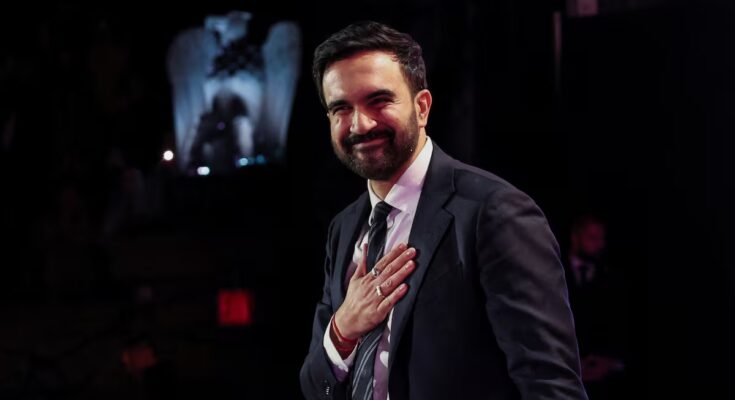New Yorkers who elected Zohran Mamdani as mayor on Nov. 5 were unfazed by his calling himself a democratic socialist. Much less that Trump called him a communist, exploiting the old phobia of the right’s reds, so profitable for Joseph McCarthy in the 20th century. They also did not believe the propaganda of establishment democratic; not because they suddenly became socialists, but because – I suspect – the young 34-year-old politician opposed dystopia.
The world that Trump has embodied in his second term is defined by a moral investment that goes unnoticed only by those who have taken charge Kool-Aid MAGA. Inflation has made food, housing and basic services nearly unaffordable for workers and the middle class, especially in New York and other cities dominated by real estate speculation. As the lives of millions deteriorate and the recent government shutdown has made it clear that at least 24 million could lose their health insurance in one fell swoop, Trump insists that the economy has never been better, orders the construction of a $300 million ballroom at the White House and spends his weekends golfing at his Florida resort (trips paid for by taxpayers at a rate of three million greenbacks per visit).
But this is only the most visible front of the crisis. A country that has historically been seen as a nation of immigrants is now witnessing how millions of undocumented immigrants are criminalized, persecuted, and stripped of their rights without having committed any crime. You don’t have to go back down memory lane to recall another recent elite scene: Just six months ago, to the angry cheers of the MAGA crowd, Elon Musk threatened, chainsaw in hand, to “decapitate” the government, a poetic license to fire hundreds of thousands of public employees. Today Musk is one of the most unpopular figures in the country, and Trump, with just 26% approval on economic issues, is on the same path.
Mamdani symbolizes the opposite: someone concerned with defending his neighbors’ right to a dignified life. A hope against this repertoire of distorted values. Quite a few, including Slavoj Žižek, saw in this left-wing immigrant the possibility of renewing the Democratic Party. Perhaps. But it’s too early to tell. To become more than just a disruptive, fresh and charismatic figure, he will have to successfully govern an eight-and-a-half-million-story, five-county city – several populous cities in their own right – and with deeply entrenched crises like housing shortages and the collapse of public transportation.
Its management risks being sabotaged on all fronts: from large real estate consortia to Wall Street tycoons. In addition to making the city more accessible and efficient, the Muslim and immigrant mayor will have to deal with the ideological, racial and religious prejudices of our time. New York is a democratic, plural and tolerant city, but the national political environment is tense, with a Republican Party obsessed with sowing fear of immigrants from the South as the axis of its project of white supremacy. And, of course, he will also have to deal with generational competition within his own party and the furtive hypocrisy of the Democratic elite. And who is Zohran Mamdani if not an “unredeemed” left-wing radical; Muslim, pro-Palestinian and of African origin? Due to their prestige and popularity, several famous mayors of the past, such as Mario Cuomo and Michael Bloomberg, were seen as good prospects for the White House. They never arrived. But if Mamdani overcomes these obstacles, the path will be open to lead democratic renewal and make the national leap.
The decline of the empire
All this, for now, is hypothetical. He hasn’t even taken office and will have to spend a year or two evaluating his management, and at least three to know if he has achieved concrete results. The immediate problem is another: Trump and his acolytes are disfiguring the American experiment from its foundations, transforming the country into a grotesque version of the dreams that have inspired many generations, from the founding fathers to Martin Luther King.
There are many examples, but the most dramatic are ICE raids against people suspected of being undocumented immigrants. It’s not just a question of legal status: these people are literally detained without warrants. In September, the Supreme Court authorized ICE to take action on racial profiling, based on the notion of “apparent ethnicity,” as Brett Kavanaugh wrote. According to this logic, if someone has dark skin, dark hair and speaks Spanish, it is sufficient to generate a “reasonable doubt” about their immigration status; this is not the case if you have white skin, blue eyes, light hair and speak Danish or Polish. This legal framework, built on the fallacy of an “invasion” by the poor and criminal South, is racism distilled from the doctrine of the great replacement that has permeated the West. That this should happen in a nation that proclaims itself a beacon of freedom – and after decades of fighting for civil rights – is a historic shame.
There is no easy way to stop the maelstrom of racism, sexism and corruption unleashed by Trump. The Democrats, without a compass and in the minority in both houses, barely managed to counterbalance it. Until the November 5 elections, no one bet a cent on the successes achieved by winning governorships, mayors and local legislatures.
The country that wakes up
And there is a point that few saw: it wasn’t just the democratic machine or its new figures. It was the undervalued citizens who raised their voices in massive protests and found at the ballot box a channel to express their repudiation of the Trump administration’s moral debacle.
The marches promoted by the No Kings Coalition are the first major milestone of city protest in the Trump era: 1.1 million in April; between two and four million in June; and about seven million in October. They are the largest demonstrations since the 2017 Women’s March and the 2020 Black Lives Matter protests.
Less resounding, but constant, was the rejection of the ICE. The seizure of cities in several states has sparked questions from citizens and some court victories against excessive use of force. While Los Angeles and Chicago failed to stop the deployment of ICE and the National Guard, they were widely condemned. Many people, openly or otherwise, reject Trump’s immigration policy.
And a more recent sign of protest has come from the activism of the victims of the sexual predator Jeffrey Epstein. At first glance it might seem like an isolated front, but it is part of the same fight against the structural abuses of powerful men. The fight to make Epstein’s files public was a resounding triumph for his victims and Trump’s worst nightmare during his second presidency. Despite his attempts to block publication, pressure, including from figures in the MAGA movement itself such as Marjorie Taylor Greene, Lauren Boebert and Nancy Mace, forced him to sign the decree to make them public. That internal breakdown was evident when, on the same day, a furious Trump launched sexist attacks against two female journalists, calling them a “pig” and incompetent respectively, for asking questions he considered inappropriate and in bad taste. These attacks are another example of the abuse and mistreatment by powerful people that women report.
Just as Epstein’s victims organized collectively and strategically to seek justice and visibility in the face of the tycoon’s crimes, other groups across the country are mobilizing to address the decline of those in power today. Like Mamdani, they are symbols of a hope that resists the moral disorder embodied by the most powerful political, institutional and economic figures. There are also clear signs that the United States craves renewal, from the cities to the heart of power in Washington. Trump and his accomplices have promised that renewal. It is clear that they cannot and do not want to make it happen. And they have already given sufficient proof that they are irredeemable. Hope slips through the cracks of the MAGA dystopia.



